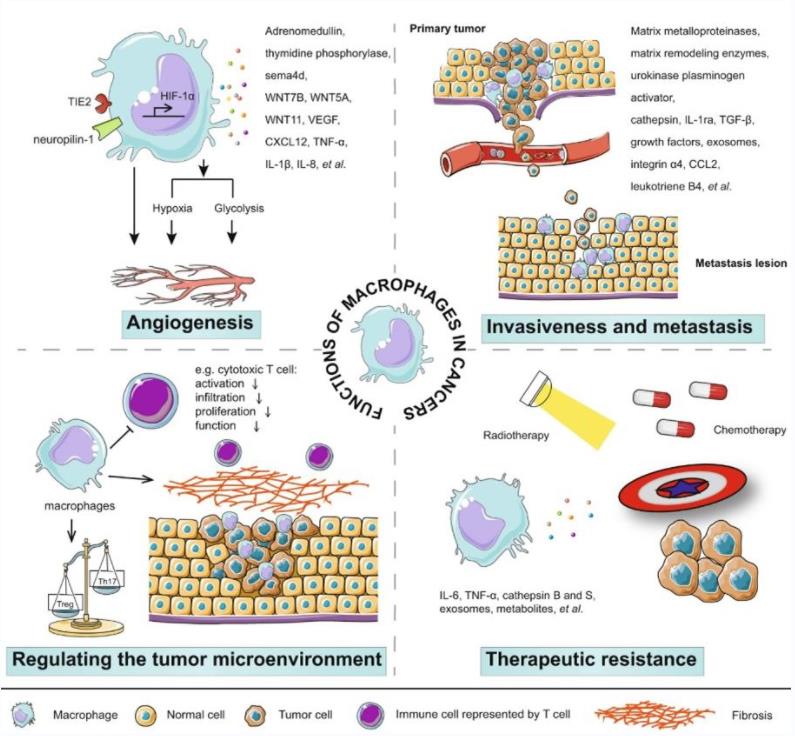Macrophage-Involved Immuno-Oncology Models for In Vivo Testing
Macrophage-involved Immuno-oncology Models Serve as Important Tools for In Vivo Testing
Various immunotherapies and anticancer drugs have achieved certain success in cancer treatment, and preclinical evaluation of these drugs and therapies is an essential step before applied to clinical. However, there are a limited number of models available to evaluate the interaction between the human immune system and tumors. Evidence shows that macrophages are powerful immune effector cells that play important functions in tumor immunotherapy. Given the active role of macrophages in therapeutic strategies, they have become potential targets for improved cancer treatment. Therefore, it is crucial to develop macrophage-involved immuno-oncology models for in vivo testing.
 Fig. 1 Macrophages play an important role in cancer.1
Fig. 1 Macrophages play an important role in cancer.1
Our Macrophage-Involved Immuno-Oncology Models for In Vivo Testing
To evaluate the effectiveness against tumors in animal models, Creative Biolabs succeeded in developing macrophage-involved immuno-oncology models for in vivo testing. We employ the co-inoculation approach to generate macrophage-involved immuno-oncology models co-inoculated with CD3+ T cells, induced macrophage, and cancer cells. Based on this, we provide multiple types of macrophage-involved immune-oncology models for global customers’ immediate use. In addition, we are confident in providing customized solutions to develop a model that is appropriate for your diverse demands. Noteworthy, we also offer other types of immune-oncology models (i.e., DCs-involved immune-oncology models) to support your projects. Together with our top-ranking research team, we have more confidence in helping every customer to:
-
Select the appropriate cancer models/cell lines;
-
Select suitable host animals consistent with customers' needs;
-
Make a design for projects;
-
Observe the model and analyze its efficacy;
-
Evaluate the macrophage-involved immune-oncology models.
Here we provide a wide range of selected humanized immunodeficient mouse models used in immuno-oncology:
|
Strains
|
Mouse models
|
|
General strains
|
B-NDG; BRG; C57BL/6-RG; CIEA BRG; CIEA NOG; NCG; NOG; NRG; NOD-RG; NSG; NSI
|
|
MHC-affected strains with genetic alterations
|
DRAGA; HUMAMICE; NOG-dKO or NOG-B2Mnull, IAnull; NOG I-Abeta <-/->; NSG-A2/DR1; NSG-B2Mnull IA IEnull; NSG-(KbDb)nullIAnull
|
|
Genetically modified strains for cytokine overexpression
|
BRGST; hIL2-NOG; MISTRG; MISTRG6; NOG-EXL; NSG-SGM3
|
|
Other genetically modified strains
|
BRGS; BRGSKW-v; NBSGW; NOG-pRorc γc; NSG-W41; TKO
|
Advantages of Our Macrophage-Involved Immuno-Oncology Models
-
Facilitate research on the immune regulatory properties of the tumor microenvironment.
-
Excellent models to replicate the dynamics of pathogen-human immune system interactions.
-
Highly sensitive in response to stimuli.
-
Extensive experimental window duration.
As a leading company in the tumor research industry, Creative Biolabs is constantly developing more effective tools to evaluate anti-cancer drugs and immunotherapies in preclinical examination. If you want to know more details about our macrophage-involved immune-oncology models for in vivo testing, please get in touch with us without hesitation. We will try our best to deliver the best service for you.
Reference
-
Duan, Zhaojun, and Yunping Luo. "Targeting macrophages in cancer immunotherapy." Signal transduction and targeted therapy 6.1 (2021): 127.
For Research Use Only | Not For Clinical Use


 Fig. 1 Macrophages play an important role in cancer.1
Fig. 1 Macrophages play an important role in cancer.1
 Download our brochure
Download our brochure